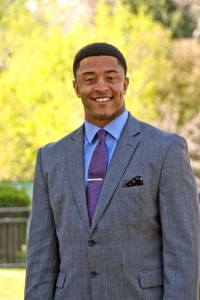
Editor’s note: This is the first post in our school choice wish series. See the rest of the line-up here.
by Ben DeGrow
The power of a scholarship can open up doors not only to a new school, but to a new path in life. That reality has brought one Denver man back to his roots, where he works full time to help provide those opportunities for a new generation.
Fifteen years ago, James Coleman was an African-American middle school kid living with his mom. They had been back in Denver for a year, after a painful separation from James’ stepfather in Florida. He had spent most of his young life with relatives in a gang-ridden neighborhood in Las Vegas.
Back in the city of his birth, 12-year-old James seemed to be on a predictable, and not very hopeful, course. Enthralled with an urban subculture in which it was cool to act like a “punk,” he was getting in a lot of trouble at Smiley Middle School.
“My issue was discipline,” James tells me in a phone conversation. “As a result of not being disciplined, I wasn’t focusing in class. I was a distraction to other students, too.”
Enter ACE Scholarships, then a brand-new nonprofit organization dedicated to giving K-12 students private tuition aid. James’ mother learned about ACE from her friend Kathy Porter, whom the organization had hired to help administer the program.
An ACE scholarship helped give the young man a fresh start at Excel Institute, a Baptist school that primarily serves the African-American community. Administrator Vivian Wilson’s higher behavioral expectations, strictly enforced, set a tone for focused learning. So did the daily dress code.
“Black slacks, black tie, blue Oxford shirt, black shoes,” James quickly fires off. His recollection is noteworthy, considering he only spent the seventh grade at Excel. But it was consequential. “That one year set me straight.”
Thankfully, the ACE scholarship moved with James’ family as they relocated farther east to the city of Aurora. He attended Aurora Christian Academy for the next five years thanks, in part, to ACE’s support. His mom also sacrificed to cover part of the tuition, and the private school found additional resources as well.
That’s what James describes as the scholarship organization’s secret sauce: “ACE works because we don’t do it alone. The family comes to the table with funds; the community, through ACE, comes to the table with funds; and the private school also invests in the child. All three working together to give a child a better life.”
James earned his high school diploma at Aurora Christian with a lasting appreciation. He also met his future wife Shayna there. They are now blessed with 4-year-old twins.

Graduating from Oral Roberts University in 2009 with a major in psychology and a minor in business administration, James returned to Denver. The economic recession made it an inopportune time to launch a career. He was working part time at both 24-Hour Fitness and Home Depot, when he got a call from ACE.
What began as an invitation to volunteer and participate on the alumni board soon became an offer of full-time employment. Today he is the vice president for community engagement. “I am responsible for advocating for school choice,” he declares with pride and passion.
James, now 27, dedicates time and energy into building relationships with business leaders, community leaders, clergy, and lawmakers.
With the aid of many generous donors, ACE continues to help thousands of low-income Colorado kids overcome tuition costs that otherwise would be a barrier to the type of educational opportunity they need. To help match many more kids with thousands of empty private school seats would require a change in state law.
James raises the question that drives his work: “Our organization is doing a fantastic job, but how can we incentivize [donors] to give more and convince them to do more through policy?”
The looming answer is establishing tax credits for donations to scholarship organizations like ACE and the handful of others that currently operate in Colorado. Fourteen other states have paved the way with their own versions of a scholarship tax credit program.
The need for change is largely evident. But as part of a larger Colorado team working to expand school choice, James is helping key figures see the promise and potential of this approach.
He firmly believes many low-income students and parents will respond to tangible new opportunities. “Once people realize the option is there, they demand more.”
Ultimately, James wants to help fulfill many more school choice wishes like the one that set him on a new path. He has glimpsed the alternative. During a pre-ACE job search he made a firsthand visit to one of the state’s prisons, where he applied to work and later turned down a job offer. There he saw the sad plight of incarcerated men, many of his own color.
“We have kids that are being conditioned and grown into this mindset that all I can do is rap and play ball,” James explains. “More times than not they revert to this because they don’t have opportunities.”
Those opportunities include access to a high-quality and suitable education. As the great Frederick Douglass famously said, “It is easier to build strong children than to repair broken men.”
A school’s label (e.g., public, charter, private) doesn’t matter to James. He simply desires to see more Colorado youths, especially those in poorer neighborhoods, access the chance to succeed.
“The opportunity for a quality education should be extended to everybody,” he says. “We shouldn’t allow adults and interests to get in that way.”
Who could argue with a wish like that?
Ben DeGrow is senior education policy analyst for the Independence Institute, a Denver-based think tank.
Coming Monday: Peter Hanley, executive director of the American Center for School Choice.



[…] written by one of my Education Policy Center friends. Not your typical dry policy argument, but the true story of a Denver man whose life was changed for the better by a K-12 tuition scholarship, and now works full-time to […]